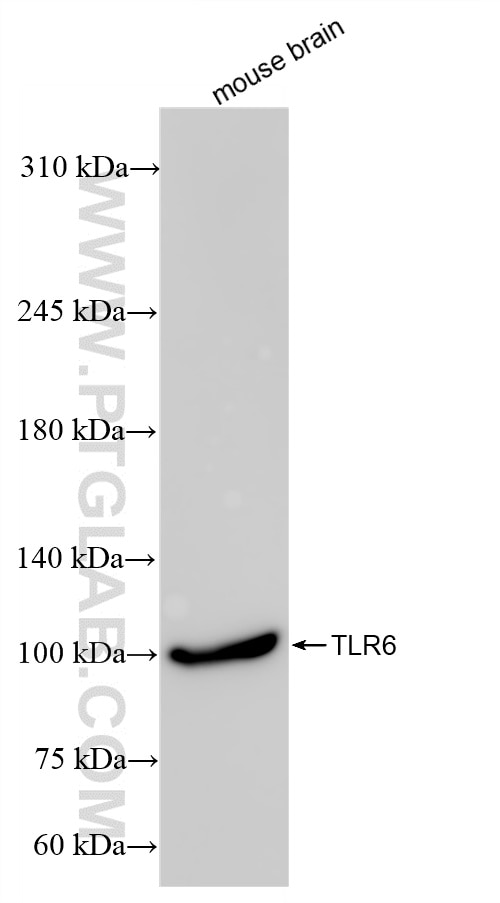Validation Data Gallery
Tested Applications
| Positive WB detected in | mouse brain tissue |
Recommended dilution
| Application | Dilution |
|---|---|
| Western Blot (WB) | WB : 1:5000-1:50000 |
| It is recommended that this reagent should be titrated in each testing system to obtain optimal results. | |
| Sample-dependent, Check data in validation data gallery. | |
Product Information
84811-1-RR targets TLR6 in WB, ELISA applications and shows reactivity with human, mouse samples.
| Tested Reactivity | human, mouse |
| Host / Isotype | Rabbit / IgG |
| Class | Recombinant |
| Type | Antibody |
| Immunogen | Peptide 相同性解析による交差性が予測される生物種 |
| Full Name | toll-like receptor 6 |
| Calculated molecular weight | 480 aa, 56 kDa |
| Observed molecular weight | 100 kDa |
| GenBank accession number | BC111755 |
| Gene Symbol | TLR6 |
| Gene ID (NCBI) | 10333 |
| RRID | AB_3672136 |
| Conjugate | Unconjugated |
| Form | Liquid |
| Purification Method | Protein A purfication |
| UNIPROT ID | Q9Y2C9 |
| Storage Buffer | PBS with 0.02% sodium azide and 50% glycerol{{ptg:BufferTemp}}7.3 |
| Storage Conditions | Store at -20°C. Stable for one year after shipment. Aliquoting is unnecessary for -20oC storage. |
Background Information
TLR6, also known as CD286, belongs to the Toll-like receptor (TLR) family which is important in the innate immune response to pathogens. TLRs are highly conserved from Drosophila to humans and share structural and functional similarities. TLR6 can form a heterodimer with TLR2. TLR6 and TLR2 are both recruited to the macrophage phagosome, where they recognize peptidoglycan, a Gram-positive pathogen component (PMID: 11095740). TLR6 interacts with CD36, following CD36 stimulation by oxLDL or amyloid-beta 42, and forms a heterodimer with TLR4. The trimeric complex is internalized and triggers an inflammatory response.
Protocols
| Product Specific Protocols | |
|---|---|
| WB protocol for TLR6 antibody 84811-1-RR | Download protocol |
| Standard Protocols | |
|---|---|
| Click here to view our Standard Protocols |
